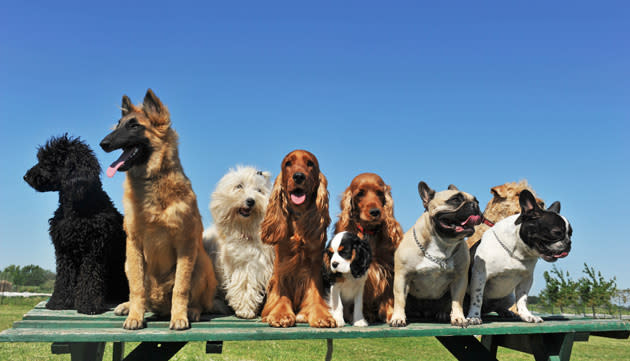Know Why Your Dog Barks

Where there are dogs, there's barking—a sound that can communicate a wide range of emotional states, from happiness to anger. When your dog barks joyously as you enter the house after being away all day, his bark makes you smile. But when a dog barks incessantly for no reason that you can see, it's easy to feel bewildered, annoyed, and frustrated. For every bark, there's a reason—and the more you understand about this natural behavior, the better you can control it.
Here are a few general facts to help you understand why your dog might have a barking obsession.
Born to bark
Some dogs seem to bark around the clock. Many of today's more popular smaller breeds were originally used as watchdogs by farmers. Though their occupations have changed over time (from watchdog to family member), their instinctive dispositions in many cases have not. Therefore, many of these dogs are genetically predisposed to bark at the slightest sound or vibration.
What can you do? Try training your dog to bark on command. This may limit his daily outbursts. Completely ignore him when he barks at other times. Any attention to him, even a reprimand to stop barking, can reinforce the barking behavior.
I'm guarding you
What does a good guard dog do when he feels his territory is being threatened? He barks. And since he may perceive that someone innocently walking by is a threat, he does what nature programmed him to do.
What can you do? Try blocking his view of the street or property line. A more permanent solution will require diligent training while you are at home to ensure that he barks less during those times when you are away.
I'm bored, therefore I bark
Work and sporting dogs often bark due to sheer boredom. These dogs were bred to run around and work in the great outdoors. To make up for the lack of aerobic exercise, they choose to exercise their vocal chords.
What can you do? Try setting aside a couple of extra hours of daily playtime to help alleviate his boredom.
It's just nerves
If you adopted your dog from a shelter, it's possible that he may have a history of neglect and abuse. Through no fault of their own, these dogs were never given the opportunity to develop proper social skills early on. Thus, they bark a lot.
What can you do? Try being very patient. These dogs may take a bit longer to train, but with a lots of love and extra care, in time they can come around.
More tips
These quick home remedies may prove very helpful.
• Use a word that lets your dog know you are not impressed by his barking. Words like "Enough!" or "Quiet!" work well. Use them sparingly, because if you say them too often he'll think you're barking back.
• To help your dog feel less lonely, leave a radio playing in the background. There are even special DVDs that have been designed to help keep dogs company when they're left alone at home.
• Give your dog a special chew toy BUT only for those times when you're leaving the house. When you get back home, "Mr. Special Chew Toy" goes back into hiding.
• Try keeping your dog in the calmest or quietest parts of your home.
• Keep the window blinds or curtains closed. The less he can see of the outside world, the less likely he is to bark.
The shakey-shakey can experiment
Find a metal or plastic jar that you can seal securely. Fill it up with some pebbles, loose change, or whatever you can spare around the house that makes a good rattling sound. When your dog starts barking just give the can a good shake. The noise startles him and breaks his barking cycle. When he barks again, give it another quick shake. Each time he stops barking, offer him praise. In time, he'll catch on.
Information courtesy of Mars, Incorporated and its Affiliates. All Rights Reserved 2011.

